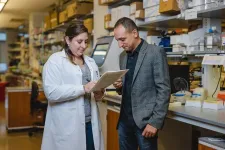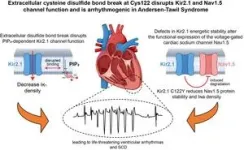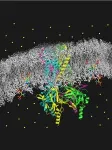(Press-News.org) PHILADELPHIA — (April 10, 2024) — The Wistar Institute’s associate professor Mohamed Abdel-Mohsen, Ph.D., along with his team and collaborators, has identified sugar abnormalities in the blood that may promote biological aging and inflammation in people living with HIV (PLWH). The findings, taken from a large data study comprising more than 1200 participants, are detailed in the new paper, “Immunoglobulin G N-glycan Markers of Accelerated Biological Aging During Chronic HIV Infection,” published in the journal Nature Communications.
Despite advances in HIV treatment, notably the success of antiretroviral therapy (ART) in suppressing the virus to undetectable levels, HIV remains incurable, with the virus persisting in a dormant state within the body. This chronic presence is linked to long-term health issues, including persistent inflammation and a higher prevalence of aging-related diseases such as cancer and neurocognitive disorders. These conditions tend to occur more frequently and at an earlier age in PLWH compared to the general population.
Abdel-Mohsen seeks to understand how chronic viral infection causes this accelerated biological aging, which refers to the body aging faster than one’s chronological years would typically indicate. By understanding the molecular mechanisms behind accelerated biological aging in people living with chronic viral infections, scientists can begin to formulate strategies to mitigate the negative effects.
While many factors in the body can contribute to accelerated biological aging, researchers focused on a novel factor: abnormalities of the human glycome — the totality of the various sugar structures circulating throughout the body. Previous studies have established a connection between aging and shifts in the glycan composition of immunoglobulins (IgGs), which are critical for immune regulation. As people age, their IgGs lose anti-inflammatory properties and gain pro-inflammatory characteristics.
Abdel-Mohsen's research investigates whether living with a chronic viral infection, such as HIV infection, exacerbates these changes, leading to premature aging and related diseases.
By comparing glycan profiles in more than 1200 individuals, both with and without HIV, the team discovered that PLWH exhibit elevated levels of inflammatory and pro-aging IgG glycan signatures. In a remarkable step forward, the team developed a machine-learning model that uses these glycan signatures to estimate the biological age of PLWH and assess the rate of aging acceleration. This glycan signature also has the potential to predict the onset of comorbid conditions in PLWH, such as cancer, years in advance.
To confirm that these glycan-associated disruptions were causal rather than merely correlative, the research team engineered HIV-specific antibodies designed to exhibit the same kind of aberrant IgG glycan modifications observed in PLWH. Testing these glycoengineered antibodies in vitro confirmed that the modified antibodies were less effective at mounting an immune response than their unmodified counterparts, suggesting that these sugar abnormalities might directly contribute to the worse clinical outcomes observed. Importantly, when they designed these antibodies to have glycans similar to those found in biologically younger individuals, these antibodies demonstrated a remarkable ability to enhance the immune system's ability to fight virus-infected cells.
"Utilizing glycan signatures to predict early onset of diseases in people living with HIV marks a pivotal shift towards proactive healthcare,” said Abdel-Mohsen. “This could significantly alter clinical outcomes, allowing for timely interventions and personalized treatment plans. The impact on treatment and management in the HIV community could be revolutionary. Beyond biomarkers, antibodies glycoengineered to mimic biologically younger glycans offer a new therapeutic avenue. This method could enhance immune responses, paving the way for innovative treatments.”
Co-authors: Leila B Giron, Qin Liu, Opeyemi S Adeniji, Xiangfan Yin, Toshitha Kannan, Jianyi Ding, David Y. Lu, Joao L. L. C. Azevedo, Andrew Kossenkov, and Mohamed Abdel-Mohsen of The Wistar Institute; David Y. Lu of Cornell University; Susan Langan, Jinbing Zhang, Sabina Haberlen, Stephen Gange, Wendy S. Post, and Todd T. Brown of Johns Hopkins University; Shuk Hang Li and Ian Frank of the University of Pennsylvania Perelman School of Medicine; Sergei Shalygin and Parastoo Azadi of University of Georgia; David B Hanna of Albert Einstein College of Medicine; Igho Ofotokun of Emory University School of Medicine; Jason Lazar of SUNY Downstate Health Sciences University; Margaret A. Fischl of University of Miami; Bernard Macatangay and Charles Rinaldo of University of Pittsburgh; Adaora A. Adimora of University of North Carolina, Chapel Hill; Beth D. Jamieson of University of California, Los Angeles; Daniel Merenstein of Georgetown University Medical Center; Nadia R. Roan of Gladstone Institutes and University of California, San Francisco; Phyllis C. Tien of University of California, San Francisco; Olaf Kutsch of University of Alabama at Birmingham; Steven M. Wolinsky of Northwestern University; Mallory D. Witt of Lundquist Institute of Biomedical Research at Harbor-UCLA Medical Center; and Alan Landay of Rush University.
Work supported by: This work is mainly supported by the NIH R01AG062383 and the NCI supplement to the Wistar Institute Cancer Center (P30 CA010815) to M.A-M. M.A-M is also funded by the NIH grants, R01AI165079, R01NS117458, R01DK123733, Penn Center for AIDS Research (P30 AI 045008), and the NIH-funded BEAT-HIV Martin Delaney Collaboratory to cure HIV-1 infection (1UM1Al126620). Mass spectrometry-based glycomic analyses was partially supported by NIH R24GM137782 and GlycoMIP, a National Science Foundation Materials Innovation Platform funded through Cooperative Agreement DMR-1933525. We would like to thank Drs. Michel Nussenzweig, Costin Tomescu, and Luis J. Montaner for providing the wild-type 10-1074 for the glycoengineering experiments and Dr. Daniel Kulp for providing HIV-1 Env trimer, BG505. Data in this manuscript were collected by the MACS/WIHS Combined Cohort Study (MWCCS). The contents of this publication are solely the responsibility of the authors and do not represent the official views of the National Institutes of Health (NIH). MWCCS (Principal Investigators): Atlanta CRS (Ighovwerha Ofotokun, Anandi Sheth, and Gina Wingood), U01-HL146241; Baltimore CRS (Todd Brown and Joseph Margolick), U01-HL146201; Bronx CRS (Kathryn Anastos, David Hanna, and Anjali Sharma), U01-HL146204; Brooklyn CRS (Deborah Gustafson and Tracey Wilson), U01-HL146202; Data Analysis and Coordination Center (Gypsyamber D’Souza, Stephen Gange and Elizabeth Topper), U01-HL146193; Chicago-Cook County CRS (Mardge Cohen and Audrey French), U01-HL146245; Chicago-Northwestern CRS (Steven Wolinsky, Frank Palella, and Valentina Stosor), U01-HL146240; Northern California CRS (Bradley Aouizerat, Jennifer Price, and Phyllis Tien), U01-HL146242; Los Angeles CRS (Roger Detels and Matthew Mimiaga), U01-HL146333; Metropolitan Washington CRS (Seble Kassaye and Daniel Merenstein), U01-HL146205; Miami CRS (Maria Alcaide, Margaret Fischl, and Deborah Jones), U01-HL146203; Pittsburgh CRS (Jeremy Martinson and Charles Rinaldo), U01- HL146208; UAB-MS CRS (Mirjam-Colette Kempf, Jodie Dionne-Odom, Deborah Konkle-Parker, and James B. Brock), U01-HL146192; UNC CRS (Adaora Adimora and Michelle Floris- Moore), U01-HL146194. The MWCCS is funded primarily by the National Heart, Lung, and Blood Institute (NHLBI), with additional co-funding from the Eunice Kennedy Shriver National Institute Of Child Health & Human Development (NICHD), National Institute On Aging (NIA), National Institute Of Dental & Craniofacial Research (NIDCR), National Institute Of Allergy And Infectious Diseases (NIAID), National Institute Of Neurological Disorders And Stroke (NINDS), National Institute Of Mental Health (NIMH), National Institute On Drug Abuse (NIDA), National Institute Of Nursing Research (NINR), National Cancer Institute (NCI), National Institute on Alcohol Abuse and Alcoholism (NIAAA), National Institute on Deafness and Other Communication Disorders (NIDCD), National Institute of Diabetes and Digestive and Kidney Diseases (NIDDK), National Institute on Minority Health and Health Disparities (NIMHD), and in coordination and alignment with the research priorities of the National Institutes of Health, Office of AIDS Research (OAR). MWCCS data collection is also supported by UL1-TR000004 (UCSF CTSA), UL1-TR003098 (JHU ICTR), UL1TR001881 (UCLA CTSI), P30-AI-050409 (Atlanta CFAR), P30-AI-073961 (Miami CFAR), P30 AI-050410 (UNC CFAR), P30-AI-027767 (UAB CFAR), P30-MH-116867 (Miami CHARM), UL1 TR001409 (DC CTSA), KL2-TR001432 (DC CTSA), and TL1-TR001431 (DC CTSA). The MACS CVD2 study is funded by National Heart Lung and Blood Institute (NHLBI), R01 HL095129-01 (Wendy Post). The authors gratefully acknowledge the contributions of study participants and dedication of the staff at MWCCS sites.
Publication information: “Immunoglobulin G N-glycan 1 Markers of Accelerated Biological Aging During Chronic HIV Infection,” from Nature Communications
END
Wistar scientists identify pro-aging ‘sugar signature’ in the blood of people living with HIV
The Abdel-Mohsen lab findings shed light on how sugar molecules in the blood of people living with HIV may accelerate biological aging
2024-04-10
ELSE PRESS RELEASES FROM THIS DATE:
CAMH develops first ever clinically validated natural supplement to prevent postpartum blues
2024-04-10
A new study published in the Lancet discovery science journal eClinicalMedicine has confirmed that a novel natural supplement—invented, researched, developed and commercialized at the Centre for Addiction and Mental Health (CAMH)—prevents postpartum blues, and reduces symptoms of postpartum depression over the following six months after giving birth.
Up to 8 out of ten new mothers experience postpartum, or ‘baby,’ blues, characterized by mood swings, crying spells, anxiety and difficulty sleeping. The condition usually begins within the first few days after delivery and may last for up to two weeks. Postpartum ...
Breakthroughs in durable mechanical circulatory support (MCS) devices add years to lives and life to years for heart failure patients
2024-04-10
Embargoed until 10:00 a.m. Wednesday, 10 April, 2024 Central European Summer Time (GMT +2)
10 April, 2024, Prague, Czech Republic—The same technology that enables a bullet train to travel at speeds up to 200 mph without touching its rails now keeps a failing heart pumping—and in the near future, it will do so via a wireless power connection. Mandeep R. Mehra, MD, FRCP described the cutting-edge heart pump and other advances in mechanical circulatory support (MCS) today at the Annual Meeting and Scientific Sessions of the International Society for Heart and Lung Transplantation (ISHLT) in ...
AI will provide heart transplant surgeons with new decision-making data
2024-04-10
Embargoed until 10:00 a.m., Wednesday, 10 April, 2024 Central European Summer Time (GMT +2)
10 April 2024, Prague, Czech Republic—Artificial intelligence will significantly impact the heart transplantation process by helping physicians better assess the complex factors impacting patient outcomes, according to researchers at today’s Annual Meeting and Scientific Sessions of the International Society of Heart and Lung Transplantation (ISHLT) in Prague.
“Until now, we’ve assessed the likelihood of transplant success based on individual risk factors,” said Eileen Hsich, medical director of the Heart Transplant Program at the Cleveland ...
Novel UV broadband spectrometer revolutionizes air pollutant analysis
2024-04-10
Sunlight has a major influence on chemical processes. Its high-energy UV radiation in particular is strongly absorbed by all materials and triggers photochemical reactions of the substances present in the air. A well-known example is the formation of ground-level ozone when UV light hits nitrogen oxides. A research team led by Birgitta Schultze-Bernhardt from the Institute of Experimental Physics at Graz University of Technology (TU Graz) is now utilising this high reaction potential for a new method of environmental monitoring. ...
Kyiv’s Heart Institute keeps transplanting hearts despite war
2024-04-10
Embargoed until 8:30 a.m. Wednesday, 10 April, 2024, Central European Summer Time
10 April, 2024, Prague, Czech Republic—Amid the persistent threat of missiles from the air and an array of hazardous terrestrial obstacles, the Heart Institute of the Ministry of Health in Kyiv has continued to provide heart transplants to Ukraine’s citizens, performing 40 of the life-saving procedures since Russia’s full-scale invasion of the country in 2022. The Heart Institute’s Director Borys Todurov, MD, PhD, reported on his team’s extraordinary efforts today at the Annual Meeting and Scientific Sessions of the International Society for Heart and Lung Transplantation ...
Can artificial intelligence techniques help clinicians assess and treat patients with bone fractures?
2024-04-10
Investigators have applied artificial intelligence techniques to gait analyses and medical records data to provide insights about individuals with leg fractures and aspects of their recovery.
The study, which is published in the Journal of Orthopaedic Research, uncovered a significant association between the rates of hospital readmission after fracture surgery and the presence of underlying medical conditions. Correlations were also found between underlying medical conditions and orthopedic complications, although these links were not significant.
It was also ...
Can probiotics plus vitamin D supplements benefit people with schizophrenia?
2024-04-10
Previous studies have questioned whether gut microbe imbalances and vitamin D deficiency may be linked to schizophrenia. New research published in Neuropsychopharmacology Reports now indicates that taking probiotics plus vitamin D supplements may improve cognitive function in individuals with the disease.
For the study, 70 adults with schizophrenia were randomized to take a placebo or probiotic supplements plus 400 IU vitamin D daily for 12 weeks. Severity of the disease and cognitive function were evaluated by tests called the Positive and Negative Syndrome Scale (PANSS) and the 30-point Montreal Cognitive Assessment (MoCA), respectively.
A total of 69 patients completed the study. The MoCA ...
Could novel immune cell therapy combat hepatitis B infections?
2024-04-10
Chronic infection with the hepatitis B virus (HBV) causes progressive liver problems, and eradication of the virus remains a formidable challenge. New research in FEBS Letters indicates that treatment that boosts the effects of immune cells called stem cell memory T cells (TSCMs) may be a promising strategy for combating HBV.
In the study, investigators identified TSCMs in patients with chronic HBV infection and analyzed their effects in a mouse model of HBV. After introducing TSCMs from patients ...
Women aged older than 65 years may be able to safely continue taking hormone therapy
2024-04-10
CLEVELAND, Ohio (April 10, 2024)—After the Women’s Health Initiative (WHI) in 2002, many women have resisted taking hormone therapy (HT), especially after age 65 years, because of fears of increased risks for various cancers and heart disease. A new study shows that those fears may be unfounded, depending on the type, route, and dose of HT. Results of the study are published online today in Menopause, the journal of The Menopause Society.
Despite the conflicting results of a follow-up WHI study in 2004 and dozens of other studies since that time, a percentage of healthcare professionals and their middle-aged female patients continue to believe that ...
Four-part nutrition intervention program reduced adolescent malnutrition in Tanzania
2024-04-10
Adolescence is an important period of life for healthy growth. Malnutrition during this seminal period may have long-term adverse effects on health and development. In sub-Saharan Africa, there is a lack of nutrition programming for adolescents. Adolescent malnutrition represents an urgent issue in sub-Saharan Africa, which has a long history of undernutrition and a rising issue of overweight and obesity.
Findings from a new study suggest that a four-component school-based nutritional intervention package improved ...
LAST 30 PRESS RELEASES:
COVID-19 vaccination during pregnancy may help prevent preeclampsia
Menopausal hormone therapy not linked to increased risk of death
Chronic shortage of family doctors in England, reveals BMJ analysis
Booster jabs reduce the risks of COVID-19 deaths, study finds
Screening increases survival rate for stage IV breast cancer by 60%
ACC announces inaugural fellow for the Thad and Gerry Waites Rural Cardiovascular Research Fellowship
University of Oklahoma researchers develop durable hybrid materials for faster radiation detection
Medicaid disenrollment spikes at age 19, study finds
Turning agricultural waste into advanced materials: Review highlights how torrefaction could power a sustainable carbon future
New study warns emerging pollutants in livestock and aquaculture waste may threaten ecosystems and public health
Integrated rice–aquatic farming systems may hold the key to smarter nitrogen use and lower agricultural emissions
Hope for global banana farming in genetic discovery
Mirror image pheromones help beetles swipe right
Prenatal lead exposure related to worse cognitive function in adults
Research alert: Understanding substance use across the full spectrum of sexual identity
Pekingese, Shih Tzu and Staffordshire Bull Terrier among twelve dog breeds at risk of serious breathing condition
Selected dog breeds with most breathing trouble identified in new study
Interplay of class and gender may influence social judgments differently between cultures
Pollen counts can be predicted by machine learning models using meteorological data with more than 80% accuracy even a week ahead, for both grass and birch tree pollen, which could be key in effective
Rewriting our understanding of early hominin dispersal to Eurasia
Rising simultaneous wildfire risk compromises international firefighting efforts
Honey bee "dance floors" can be accurately located with a new method, mapping where in the hive forager bees perform waggle dances to signal the location of pollen and nectar for their nestmates
Exercise and nutritional drinks can reduce the need for care in dementia
Michelson Medical Research Foundation awards $750,000 to rising immunology leaders
SfN announces Early Career Policy Ambassadors Class of 2026
Spiritual practices strongly associated with reduced risk for hazardous alcohol and drug use
Novel vaccine protects against C. diff disease and recurrence
An “electrical” circadian clock balances growth between shoots and roots
Largest study of rare skin cancer in Mexican patients shows its more complex than previously thought
Colonists dredged away Sydney’s natural oyster reefs. Now science knows how best to restore them.
[Press-News.org] Wistar scientists identify pro-aging ‘sugar signature’ in the blood of people living with HIVThe Abdel-Mohsen lab findings shed light on how sugar molecules in the blood of people living with HIV may accelerate biological aging




